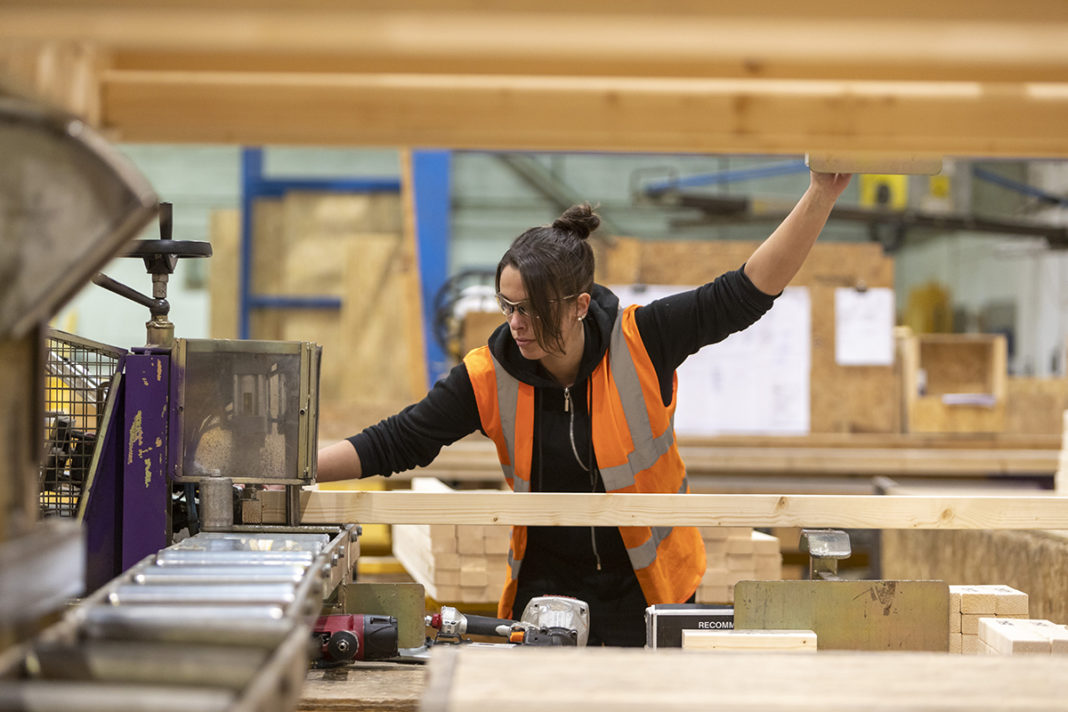
STEWART Milne Group has revealed that in-house training has allowed more females to make a mark in what has traditionally been a male-dominated industry.
Ahead of International Women’s Day, the firm highlighted the success of factory operative Aimee Bascombe, a self-confessed ‘DIY disaster zone’ before she started working for Stewart Milne Timber Systems. In the past six months, Aimee has been trained on the machinery she uses but has also gained skills and confidence as a tradesperson.
“Before, if something was broken around the house, I would ask a friend or pay for someone to fix it,” she explained. “Now I’ll give it a go myself because I now know I’m good with my hands. I really enjoy the work that I do. I applied to Stewart Milne Timber Systems because I wanted a change from my previous job but now I really feel like I’ve found my vocation; a job that fits my lifestyle and skill set. I wish I’d made the move sooner.
“I didn’t have any experience in construction, but I was unhappy in my previous job as a courier. My friend, who was working at Stewart Milne, recommended that I looked into the job opportunities available. They knew that I liked working on my feet and figured I would be attracted by the manual aspect of the job. She also spoke highly of the training on offer, as well as the flexible company benefits including private healthcare, dental insurance and a good pension scheme.”
Since starting, Aimee’s confidence has grown so much that she has delivered training to newer members of staff, including new colleague, Sarah Gall, another factory operative who started five months ago.
Previously in logistics, Sarah joined Stewart Milne Timber Systems with a background in HGV transport before moving to the factory for a more hands-on role. With no previous experience of working with timber-cutting machinery or in a factory, Sarah has already become a valuable member of the factory team.
Stevie Mitchell, factory manager at Stewart Milne’s Westhill site said, “By providing our own in-house training, we can tailor the content of courses specifically to the needs of our business and our staff. This allows employees to gain the knowledge they need and develop their skills without leaving the factory. New recruits are not required to be highly skilled to begin with because our quality in-house training equips them with the skills they need and avoids the ‘bad habits’ that can be picked up from previous experience. As a result, we know that our staff are working the ‘Stewart Milne Way’ and to the high standard we expect.”
Also marking International Women’s Day were a number of industry bodies, who hailed the rise in female electrical apprenticeships.
The Scottish Joint Industry Board (SJIB), Scottish Electrical Charitable Training Trust (SECTT), SELECT and Unite the Union all welcomed figures which showed that 13 female apprentices are currently training to be electricians in 2019-2020, compared to just seven in 2018-2019.
Fiona Harper, secretary of the SJIB and director of employment and skills at SELECT said, “In the month that we celebrated both Scottish Apprenticeship Week and International Women’s Day, it’s heartening to see more young women than ever taking up electrical apprenticeships in Scotland. It’s also heartening to see that all these women are there on merit. Like all apprentices, they were required to pass an assessment before they were accepted onto the apprenticeship programme, and each demonstrated the aptitude and competence to do so.
“There is clearly a growing realisation among young women that being an electrical professional is a viable career. The rise of renewables and the next generation of electrical technology is making our industry more attractive to would-be electricians of both genders, so it is now up to all of us to tap into this enthusiasm and ensure we keep a pipeline of talent – both male and female – coming through.”
Anne Galbraith, CEO of SECTT added, “These figures, although modest, are extremely encouraging and show a definite upward trend in women wanting to become electricians. It is a testament to the hard work of the SJIB and SECTT that these young women are now succeeding in their apprenticeships and are working side-by-side with their male counterparts. Female apprentices always do extremely well both on site and at college and are respected by their colleagues.”
Unite the Union claimed urged the Scottish Government to do more to encourage young women to take up electrical apprenticeships. Regional officer Scott Foley commented, “Seeing the rise in female apprentices is encouraging – but just think what could be achieved if Holyrood encouraged our young women to do so. We know that there is an untapped seam of female talent out there – what we need is a concerted government campaigns and programme of investment to inspire them.”
Scott, who is also lead trade union officer for the SJIB added, “If the Scottish Government was to actually help encourage more young women to become electrical apprentices, the benefits would be two-fold. Firstly, we would help to address the skills shortage that currently affects the sector. And secondly we would demonstrate that Scotland is a progressive, forward-thinking country that encourages its young women to break down boundaries and succeed in what is perceived as a traditionally male-oriented industry.”








